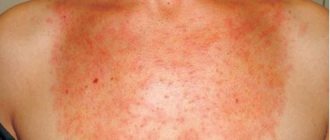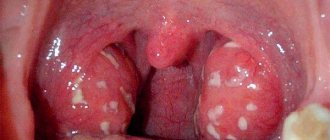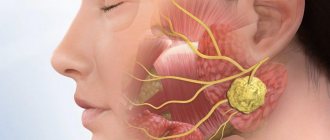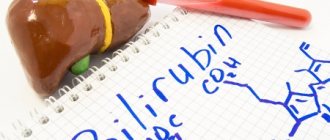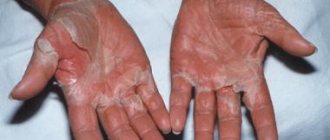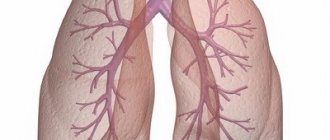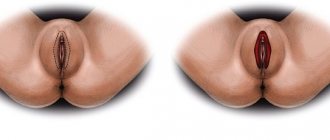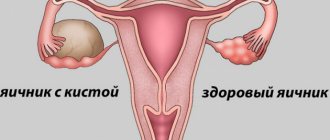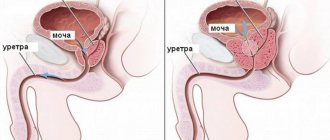The article provides a definition of the disease, symptoms in children and adults, and methods of elimination.
Herpes sore throat is one of the clinical infections that occurs as a result of intestinal Coxsackie viruses entering the body. This disease is associated with herpes only by the same root name.
The fact is that visually, this type of sore throat is similar to its rash. It is worth noting that for the most part the disease is not dangerous; only infants and people with AIDS are at risk. The peak of diseases with intestinal viruses traditionally occurs in autumn and winter, when the immune system is especially weakened and constant temperature changes are observed.
What it is
Herpes sore throat is a viral disease in which superficial vesicles are formed on the mucous surface of the larynx, which outwardly resemble herpes rashes. The vesicles hurt, which causes serious concern, and at the same time the temperature rises.
This disease occurs once and usually occurs in children. After a child has been ill, he can no longer get sick as an adult, thanks to the developed immunity.
There is no special treatment that directly affects herpes sore throat. To treat the disease, the doctor will advise you to stop the most pronounced symptoms, help the defense mechanisms and wait until the body of the child or adult copes with the disease itself.
Photo 1. Distinctive features
In most cases, the disease goes away without a trace , which has a good prognosis. As a rule, after recovery there are no complications, but in severe cases they still occur. For children under one year of age, herpes sore throat can pose serious life risks. In sexually mature patients, it is severe with obvious immunodeficiency, so we suggest that you familiarize yourself with this pathology in more detail.
In its course, herpes sore throat is always acute, and the severity of the existing signs and pain depends on many aspects, including the capabilities of the immune system, the virulence of the virus, etc.
Herpes sore throat in children: symptoms and treatment at home
The disease primarily affects infants and preschool children.
The disease causes considerable harm to the body, so it must be dealt with immediately, without delaying treatment.
What it is?
Herpes sore throat is an acute infectious-allergic disease. The cause of the pathology is Coxsackie viruses of groups A and B. They affect not only the oral cavity and pharynx, but also lead to disruptions in the functioning of various body systems. The disease occurs most often in young children, but in rare cases the pathology also occurs in adults.
The disease is severe, accompanied by unpleasant symptoms, weakness, and deterioration of the body.
Causes
The main causes of the disease are:
- Entering the body of the Coxsackie virus through contact with a patient.
- Past infection.
- Cold.
- Weakened immunity.
The virus can enter a child’s body in various ways: through the use of objects shared with the sick person in the house, due to the sick person’s sneezing or coughing. As soon as the virus enters the body, it begins to act actively.
If the child’s immunity is strong, herpes sore throat will not occur, but if the child’s immunity is weakened, it appears and develops quite quickly.
Causes
The disease is caused by the Coxsackie virus, which often affects children. In order for a child or adult to become ill, one or more provoking factors must be present simultaneously with the virus entering the body:
- Summer or autumn seasons, when Coxsackie enterovirus is especially active;
- Influenza illness;
- In rare cases, exposure to the herpes virus;
- State of reduced immunity;
- Acute intestinal infectious disorder;
- Severe allergic reaction;
- Susceptibility to hypothermia of the body and legs;
- Drinking a large amount of cold water or eating ice cream, which is common in children;
- Profound stress in adults;
The most dangerous period of the disease in a child is the period up to a year of life, when the symptoms are most painful and difficult to tolerate. However, at this time, herpes sore throat rarely occurs, since the baby has little contact with anyone and is carefully protected.
Typically, in childhood, the incidence occurs between 3 and 15 years , when children join peer groups in kindergarten or school, and anyone who gets sick immediately spreads the infection. The best treatment during this period will be to strengthen the natural defenses of the child’s body.
As the immune system grows and “calibrates,” it becomes more and more difficult for herpes sore throat to penetrate inside, as it encounters a serious immune barrier on its way. For infection in adulthood, a serious shock to the body's defense system is required for herpes sore throat to develop in it.
How to treat herpes sore throat with antibiotics?
Treatment of herpetic sore throat with antibiotics is allowed if bacteria have become involved, ulcers have become infected, tracheitis or bronchitis has appeared. The drugs mainly used are a number of penicillins:
- Augmentin;
- Flemoclav.
In severe cases, they are treated with macrolides (Azithromycin), cephalosporins (Cefazolin, Cephalexin) or a combination of several antibiotics. Medicines should be chosen only by the attending physician; usually the course of treatment does not exceed 10 days. After 5 days of such treatment for herpes sore throat in adults, it is recommended to use lozenges: Lizobakt, Faringosept, Grammidin, etc. In case of severe lesions of the nasopharynx, physiotherapy will help restore the mucous membrane.
How it develops - stages
Let us describe how herpes sore throat progresses:
- At the first stage, which lasts up to two days, general symptoms of a viral infection in the body appear in the form of signs of flu or a cold.
- Starting from the second day, red bubbles (vesicles) with a diameter of 1-2 millimeters form on the mucous membrane of the mouth, soft palate, and tonsils. After a day, they change color to white, containing serous exudate surrounded by a red border. Such manifestations are very similar to ordinary herpes that occurs on the lips or genitals. The temperature decreases slightly, and vesicles may combine.
- After 5-6 days, the ulcers dry out and become covered with a crust. This leads to a significant improvement in the well-being of adult and childhood patients, as intoxication decreases sharply. If a secondary infection occurs, then new erosion processes are likely to form.
- If herpes sore throat develops without complications, then after a week the patient recovers, the mucous membranes are cleansed through regeneration, the crusts fall off and are washed away.
After the main symptoms go away, inflammation of the lymph nodes is still present for some time. They are usually painful for up to 10 days from the onset of the pathology. The complete inflammatory reaction of the lymph nodes disappears after 2 weeks.
How is it transmitted?
The disease most often occurs in school-age children and children attending kindergarten. Cases of herpes sore throat in infants are rare. Breastfed babies receive protective antibodies from their mother's milk. Secretory immunoglobulins provide a good level of passive immunity, which protects the child’s body from viral infection throughout the entire period of lactation.
There are also congenital forms of the disease. The herpes virus is quite small in size and easily passes through the placental barrier. If the expectant mother is infected with a herpes infection, then pathogens can also be detected in the child’s blood after birth. If there is pathology of the placenta or the development of complications during childbirth, the risk of infection of the child increases several times.
By using shared utensils, as well as by violating personal hygiene rules, you can also easily become infected. The herpes virus survives well in the external environment for a long time. Its concentration in saliva is very high. When getting in with leftover food and not properly cleaning the dishes, viruses can cause inflammation of the tonsils.
Symptoms
At the beginning of the disease with herpes sore throat, the body temperature rises sharply to 38-39 degrees, which leads to poor health and all other symptoms of fever. Then the throat turns red and begins to sore, although there is no pain in it.
Over time, a sore throat appears; this occurs at a time when children develop characteristic external signs reminiscent of herpes rashes. Other symptoms of herpes sore throat include a runny nose and cough, and sometimes the submandibular and parotid lymph nodes may become enlarged.
In most cases, pathology is manifested by the specified sets of symptoms. However, sometimes in an adult patient there are no symptoms of a rash on the mucous membranes of the larynx, but only manifestations of an inflammatory reaction. Children, on the contrary, always suffer from external manifestations, so diagnosing their illness is more accurate and easier.
Against the background of the underlying disease, a child usually develops the following symptoms of herpes sore throat:
- the muscles and the area on the left side of the heart hurt;
- there is indigestion and intestinal upset with abdominal pain, nausea, diarrhea;
- if pyelonephritis develops, then there is pain in the lumbar region;
- with the development of conjunctivitis, only one eye is affected;
- convulsions, clouded consciousness are periodically noticeable, the condition resembles symptoms of meningitis or encephalitis;
- in addition to a rash in the throat, sometimes there are rashes on the limbs or body;
For adult patients, such symptoms are rare , and there is also a dependence - the older the child, the less pronounced the described symptoms. As we indicated, the treatment is symptomatic, therefore, in conditions where children complain of acute heart pain or severe convulsions are noticeable in an infant under one year old, it is necessary to show the little patient to a pediatrician in order to exclude complications.
What does herpes sore throat look like in the photo?
The photo below shows examples of characteristic signs that develop in children and adults:
- Hyperemia, when the throat becomes noticeably red;
- A rash consisting of painful white dots;
Photos 2, 3, 4. Symptoms and signs of herpes sore throat
Complications
Severe consequences are typical for childhood herpes sore throat in children under one and three years of age. The main danger is serous meningitis, which can even cause death. The doctor decides how and how to treat such a complication. If additional symptoms of brain damage appear, you should not delay treatment and go to see a pediatrician.
Other consequences include the formation of:
- Liver problems;
- Febrile seizures;
- Jade;
- Myocarditis;
What is herpes sore throat?
The disease is characterized by an acute inflammatory process of the palatine tonsils. White blisters can be seen on the mucous membranes. Herpes sore throat is called differently:
- enteroviral vesicular stomatitis;
- enteroviral vesicular pharyngitis;
- Zagorsky's disease;
- Ulcerous tonsillitis.
The disease began to be called herpes because of the similarity of the rashes with herpes infections; it was called sore throat because it manifests itself as a sore throat, typical of the streptococcal form. Treatment of herpangina, streptococcal and herpes differs, therefore, when prescribing therapy, it is important to make the correct diagnosis.
Diagnostics
If the patient has a typical form of herpes sore throat, which is common in children, then an examination is enough for the doctor to make a diagnosis. But a general blood test will not hurt, in which leukocytes will be increased, indicating the existence of inflammation.
Additional laboratory tests are needed in conditions of a borderline diagnosis, with symptoms of other diseases. For an accurate diagnosis you need to get the following result:
- Enzyme immunoassay, when the number of antibodies is exceeded several times;
- Polymerase chain reaction for samples of biomaterial taken from the throat, which makes it possible to accurately determine which pathogen caused the pathology.
In case of a complex course, intervention may be necessary in the process of diagnosis and treatment:
- A nephrologist, if there are significant changes in the composition of urine, which indicates a risk of kidney damage in the child;
- A cardiologist if there are disturbing pains in the heart, which can affect the functionality of this organ;
- A neurologist, when there are suspicions of lesions in the brain;
How to treat herpes sore throat?
Treatment of herpes sore throat begins with placing the patient on bed rest until complete recovery. Food for the patient should be liquid or mushy. You should drink as much warm water as possible, but only if the patient does not have symptoms of serous meningitis, otherwise cerebral edema is possible.
Medicines
You can bring down a high temperature with any antipyretic drugs that are appropriate for your age:
- Nurofen;
- Paracetamol;
- Diclofenac;
- Ibuprofen;
- Cefikon candles;
- Viburcol;
- Panadol;
- Meksalen et al.
Non-steroidal anti-inflammatory drugs will help eliminate weakness and malaise:
- Ibuprofen;
- Nimesulide.
The following are prescribed as painkillers:
- Castellani liquid;
- sodium tetraborate;
- lidocaine solution;
- solution of marborane in dimexide.
Lollipops:
- Faringosept;
- Lisobact;
- Strepsils.
Antihistamines help cope with allergic manifestations, they are prescribed:
- Suprastin;
- Diazolin;
- Loratadine.
To irrigate the tonsils in the treatment of herpes sore throat in children, aerosols are used:
- Inhalipt;
- Tantum Verde;
- Givalex.
To increase immunity after an illness, the following is prescribed:
- Imudon;
- Immunal;
- Immunorix;
- Viferon;
- Immuntil;
- Anaferon.
Treatment of herpes sore throat
Today's development of medicine does not allow preventing the disease, so there is always a risk that herpes sore throat will occur. The older children become, the lower the likelihood that they will become ill; in adulthood, the chances of infection are small.
As a preventive treatment, measures must be taken to strengthen the body's defenses. This can be achieved, for example, by tempering the child. Adults need to lead a healthy lifestyle, eat right, and exercise at least minimally.
The positive side is that the disease is one-time only; having had it once, you don’t have to worry about a recurrence. If the illness does occur, then treatment consists of eliminating the most severe symptoms, carried out at home. Here are the main measures for therapy:
- Rinsing your mouth for herpes sore throat will help prevent the introduction of other viruses and bacteria that can complicate the course and delay recovery. A wide range of herbal decoctions are suitable for this, for example, chamomile, sage with good antiseptic and anti-inflammatory properties. When rinsing, the liquid should not irritate the mouth and larynx, so you should not use hot decoctions, which is especially important for children. For a child under one year old, rinsing is done with a syringe without a needle.
- If there is swelling in the mouth or throat, then antihistamines such as Suprastin, Diazolin, etc. are taken as prescribed by the doctor.
- Means that bring down the temperature are indicated when the indicator rises above 38 degrees for children and 38.5 for adults.
- Treatment with Acyclovir is carried out only in the form of applying ointment to rashes on the oral mucosa.
- For severe sore throat, Hexoral or Ingalipt are prescribed. They accelerate tissue regeneration and protect against background contamination of bacteria and viruses.
- Warming up and warming compresses are prohibited! Due to the warm environment, the course of red sore throat is aggravated.
- In cases of severe immune suppression, agents with an immunomodulatory effect are indicated.
- Children who become ill before the age of three need more intensive support during treatment, so they are sometimes prescribed antiviral medications.
- Antibiotic therapy is administered when there is a threat of serious complications due to severe infectious lesions.
When the disease develops in young children, there is a high risk of developing meningitis and other negative consequences, so it is always important to coordinate therapy with a pediatrician, and, if necessary, go to the hospital.
What will help speed up the healing process and promote the treatment of herpes sore throat?
- Drink plenty of fluids, which accelerates the elimination of toxic substances released by the pathogen. If the condition is very serious, then hospitalization with intravenous drips with special solutions that purify the blood is indicated. If serous meningitis is suspected, then the volume of fluid consumed, on the contrary, is limited in order to avoid cerebral edema and inevitable death.
- Mandatory bed rest. Since no functional treatment is being carried out, the body itself will have to defeat herpes sore throat, which requires considerable strength, therefore, even if they are feeling satisfactorily, both children and adults should be in bed rest.
- Additional immune support can be provided by filling your diet with high-calorie foods and vitamins. The consistency of food should be in the form of a puree, so that it does not cause discomfort when swallowing and is quickly absorbed.
- The use of Acyclovir in tablets is not advisable, since the causative agent is the Coxsackie virus, and not herpes.
Which doctor should I go to? In case of infection in children, you should contact a pediatrician; in case of illness in adults, you need to consult a therapist and an infectious disease specialist.
How to eat - diet
In the first stages of herpes sore throat, children do not eat well, as the body is severely poisoned by the waste products of the virus and pain when swallowing. Force feeding is not recommended; on the contrary, you should try to cleanse the intestines, due to which the pathogen will be eliminated faster.
As your condition improves, your appetite will return. Since the larynx is irritated, food should be pureed or liquid so as not to cause discomfort during swallowing. The temperature of the food is warm or cold.
A good solution is to give your baby a sugar candy, which is nutritious due to the large amount of sugar and is also liked by children. Due to the influx of glucose, the recovering small organism will receive an influx of energy, and the abundant secretion of saliva, which has antiseptic properties, will help speed up the regeneration of the larynx and the removal of vesicles.
Treatment
Diagnosis of herpes sore throat is not difficult for an experienced clinician. When examining the mucous membranes, characteristic rashes are noted. To reliably confirm the diagnosis, a serological blood test, a throat smear, and immunological studies are required. Based on the research data, appropriate treatment is carried out.
The disease should be differentiated from aphthous stomatitis, damage to the mucous membranes due to the herpes virus, fungal infection and other diseases of the oral cavity. Diagnosis is carried out by dentists, otolaryngologists, and infectious disease specialists.
In adults
There are no specific treatment methods. Therapeutic measures are aimed at facilitating general well-being, reducing intoxication and pain. Drug treatment of herpetic sore throat includes the administration of the following groups of drugs:
- non-steroidal anti-inflammatory drugs;
- antihistamines;
- vitamin complexes;
- immunomodulators.
When a bacterial infection occurs, antibiotics are prescribed. Antibacterial therapy prevents the risks of further infection of ulcerated wounds on the mucosa. Patients should remain in bed, protect themselves from colds and contact with possible carriers of the disease. Local medications include:
- gargling and mouthwash (herbal decoctions: chamomile, oak bark, sage, calendula);
- anesthetics (lidocaine solution 2%, Orasept spray);
- antiseptic solutions (Chlorhexidine, Miramistin, Furacilin).
Patients should drink plenty of warm liquids to reduce symptoms of intoxication and eat pureed food to prevent additional damage to the mucous membranes. The best diet option would be milk porridges, puree soups, steamed cutlets and light side dishes. It is important to exclude aggressive foods (sour, salty, spicy) from the diet. As for drinks, it is better to give preference to unsweetened berry fruit drinks, rosehip decoction, chamomile infusion, and pure mineral water (previously degassed).
Note! Intoxication with herpetic sore throat in children and adults is moderate. The addition of severe symptoms of intoxication, and especially with uncontrollable vomiting and convulsions, requires immediate hospitalization of the patient due to the risks of secondary complications - meningeal infection or encephalitis.
In children
In the case of children, sore throat is usually treated in a hospital under the close supervision of specialists. Therapy for herpes sore throat in children is also aimed at relieving unpleasant symptoms, as well as accelerating the patient’s recovery. The body usually destroys the pathogenic virus on its own. To treat herpes sore throat in children, the following measures are sufficient:
- antipyretic and anti-inflammatory drugs (Paracetamol, Nurofen, Ibuprofen);
- anesthetics in lozenges, solutions, sprays (Strepsils, Hexoral, Theraflu, Lidocaine solution 2%, Tantum-Verde);
- solutions of soda and salt, decoctions of medicinal herbs.
Sometimes it is necessary to prescribe antihistamines (Suprastin, Claritin, Zyrtec). Dosage and treatment are selected taking into account the child’s age, clinical and life history. At an early age, the child can irrigate the oral cavity with a spray or a special spray bottle.
Prevention
As well as treatment, there is no special prevention against herpes sore throat. Infection occurs to anyone who has not previously suffered from this pathology. At the same time, herpes sore throat often has mild symptoms, when the tonsils become slightly inflamed and the temperature rises moderately.
In order for self-healing to take place as quickly as possible, it is necessary to strengthen natural defenses so that the body is ready for an attack and can withstand it. This is especially true for young children , whose immune system is just adapting to the environment.
In addition, strict adherence to hygiene standards will help protect yourself and your child. The sick person should have minimal contact with others and use a separate set of dishes and towels. It is recommended to periodically ventilate the room where the patient stays.
What does it look like?
Herpes sore throat is an acute infectious inflammatory process of enteroviral etiology. It has all the symptoms of an infectious disease: fever, sometimes nausea and vomiting. A characteristic sign of herpes sore throat is a rash on the oropharynx, tonsils and palate, reminiscent of herpes and causing significant discomfort.
Because the infection affects the tonsils, it is also called herpetic tonsillitis. The disease received such a common name because of its similarity with herpetic stomatitis. Rashes on the surface of the mucous membrane of the oropharynx are similar to the manifestations of herpes, but are caused by a different pathogen.
The disease is nicknamed angina because it affects the throat. However, the localization of the pathological process in these diseases is different. Sore throat affects only the tonsils, and herpetic tonsillitis can be localized on the entire surface of the oropharynx, tongue, and palate.
On the 2-3rd day from the onset of the disease, numerous reddish rashes appear in the mouth. They resemble bubbles containing a serous, cloudy liquid. Such rashes can cover almost the entire surface of the tonsils. When you try to touch them with a spoon or spatula, they quickly rupture and bloody contents flow out of them.
Usually on the 5th-6th day of illness, herpes blisters burst, exposing the inflamed and eroded mucous membrane. The entire surface of the tonsil has numerous ulcers and erosions. They bleed easily when touched. Even pieces of solid food can cause damage to the mucous membrane and lead to increased bleeding.
On days 7-10, the tonsils are usually completely cleared of rashes and begin to heal. Their surface becomes less bumpy, ulcers and erosions gradually disappear. However, atypical forms of the disease also occur. They occur mainly when the child’s immunity is reduced and the child has chronic diseases.
What needs to be examined?
An experienced doctor will distinguish herpes sore throat from other similar pathologies quickly and without problems. Its wave-like course is especially helpful in diagnosis.
If parents talk about sudden changes in the baby’s temperature on the first and third days of the disease, the diagnosis is confirmed.
In rare cases, when the pathology occurs against the background of other infections (mononucleosis or roseola), a number of laboratory tests are required:
- taking blood for a general analysis, as a result of which an increased number of leukocytes is detected;
- cultural method;
- studies - blood ELISA, RNGA, complement fixation reaction (such tests can detect antibodies to the virus that caused the development of the disease);
- PCR diagnostics – determines the type of pathogen at the DNA level.
A child with normal immunity tolerates the disease much easier, and, as a rule, he does not need complex, expensive diagnostics.
With a sharp decrease in the body's defenses, herpetic sore throat can provoke meningitis and heart problems - in such cases, the intervention of a cardiologist and neurologist is necessary.


